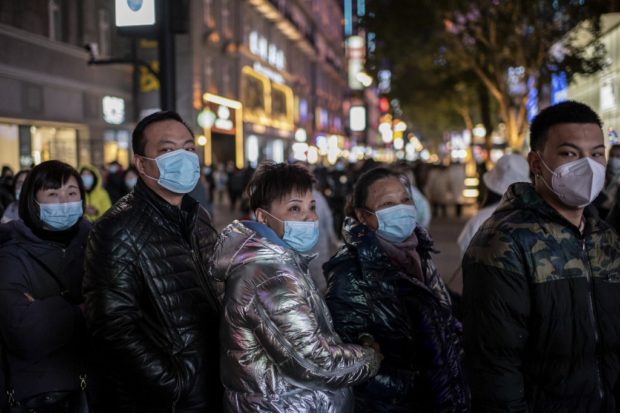
People wearing face masks stand around a giant 3D screen on Jianghan street in Wuhan on January 10, 2021, the eve of the first anniversary of China confirming its first death from the Covid-19 coronavirus. Photo by NICOLAS ASFOURI / AFP
GENEVA — Scientists at the World Health Organization warned Monday that mass vaccinations would not bring about herd immunity to the coronavirus this year, even as one leading producer boosted its production forecast.
England meanwhile launched the first of its mass-inoculation sites in major cities, racing to get ahead of the rapid spread of a new strain of the disease there.
The pandemic has infected more than 90 million people and the death toll has passed 1.94 million since China confirmed the first death in the central city of Wuhan a year ago.
China has largely brought the virus under control, but is tackling a number of local infections.
More than half a million people were placed under lockdown in Beijing on Monday as the government imposed strict measures to stamp out a handful of cases.
Infection numbers were, however, surging across Europe, particularly as Britain coped with a new strain of the disease that could see hospitals being overwhelmed.
Russia on Sunday confirmed its first case of the new UK coronavirus strain, which scientists fear is significantly more contagious.
The virus has also exploded across the United States, the hardest-hit country, where US President-elect Joe Biden publicly received his second dose of the vaccine.
‘Worst weeks’ to come
German company BioNTech said it could produce millions more doses of its coronavirus doses than originally expected this year, boosting production forecast from 1.3 to two billion.
The announcement by BioNTech, which partnered with US firm Pfizer to produce the first vaccine approved in the West, was a boost to countries struggling to deliver the jabs.
But the company also warned that Covid-19 would “likely become an endemic disease”, and said vaccines would need to fight against the emergence of new viral variants and a “naturally waning immune response”.
Later Monday, the WHO’s chief scientist Soumya Swaminathan warned it would take time to produce and administer enough vaccine doses to halt the spread of the virus.
“We are not going to achieve any levels of population immunity or herd immunity in 2021,” she said, stressing the need to maintain physical distancing, hand-washing and mask-wearing to rein in the pandemic.
Britain, the first country to approve the Pfizer/BioNTech jab, opened seven mass vaccination sites across England on Monday.
But England’s chief medical officer Chris Whitty told BBC television: “The next few weeks are going to be the worst weeks of this pandemic in terms of numbers into the NHS (National Health Service).”
“What we need to do, before the vaccines have had their effect… is we need to really double down” on observing lockdown measures, he added.
India — with the world’s second-biggest virus caseload — will begin giving shots to its 1.3 billion people from Saturday in a colossal and complex undertaking.
Russian officials said Monday they would trial a one-dose version of the country’s Sputnik V vaccine, part of efforts to provide a stopgap solution for badly hit countries.
‘Safest city’
South Africa meanwhile shut land borders for a month to counter an unprecedented resurge in cases fueled by a new virus strain.
Restrictions already in place, such as a ban on alcohol sales and large gatherings, and an overnight curfew, remain.
Portugal’s Prime Minister Antonio Costa said Monday a new lockdown was unavoidable as the country suffered record numbers of virus deaths and infections.
“We are certainly facing a third wave” of the virus, Costa told journalists.
Lebanon tightened its virus restrictions with an 11-day total lockdown and fresh travel restrictions.
A team of 10 scientists from the WHO were preparing for a mission to China on Thursday to investigate the origins of the disease.
It will “conduct joint research cooperation on the origins of Covid-19 with Chinese scientists”, Beijing’s National Health Commission said in a statement that provided no further details.
The visit, comes more than a year after the pandemic began amid accusations that Beijing tried to thwart the investigation into the virus.
The United States and Australia have led international calls for an independent inquiry, enraging China.
The anniversary of the first reported death passed by unmarked on Monday in Wuhan, where commuters moved freely to work, and parks and riverside promenades buzzed with visitors.
“Wuhan is the safest city in China now, even the whole world,” 66-year-old resident Xiong Liansheng told AFP.